Many dog owners go to great lengths to ensure their dog benefits from the best possible diet, veterinary care, and quality of life, and they are constantly seeking new ways to spoil and care for their pup. This often leads them to consider providing their pooch with a multivitamin.
But, do dogs need multivitamins? And if so, which ones are appropriate? We’ll examine these questions and others below.
Best Vitamins For Dogs: Quick Picks
- #1 Finn Multivitamin [Best Overall Vitamin for Dogs] Crafted with safety and complete canine health in mind, these chewable supplements feature a blend of vitamins, as well as glucosamine and probiotics.
- #2 Pet MD Canine Tabs [Best Vitamin Tablets for Dogs] Easy to feed alone or crushed over food, these liver-flavored tablets are vet-formulated to suit the needs of dogs of all shapes and sizes.
- #3 Vita Health Daily Vitamins [Most Affordable Vitamins for Dogs] Packed with eight core canine vitamins and ten minerals, these breath-freshening chewables won’t dent your budget too much.
- #4 NaturVet VitaPet Puppy Daily Vitamins [Best Vitamin for Puppies] These American-made soft chews are vet-formulated to suit the needs of developing puppies.
Consult your veterinarian if you believe your dog may benefit from a multivitamin or if you are concerned that your dog is suffering from a deficiency.
Vitamins are important for your dog’s health, but excessive levels of some can be dangerous and excessive levels of others are simply wasteful.
What Dogs Require Vitamin Supplements?
Most dogs satisfy their daily vitamin requirements by simply consuming a high-quality dog food that is properly fortified. However, there are some dogs who may require a supplemental vitamin.
Dogs Fed Homecooked Meals
A homemade diet can be a great option for owners with the time and desire to tackle the task, but most homecooked meals are likely deficient in several key vitamins and essential nutrients. This is especially true of raw diets. Accordingly, multivitamin supplements for dogs may be appropriate.
Dog Suffering from Specific Vitamin Deficiencies
Your veterinarian may indicate that your dog is suffering from a vitamin deficiency, which can be treated by the administration of a vitamin supplement. Some vets may recommend taking a daily multivitamin to address these needs, while others may prefer administering a single-vitamin formula.
Dogs Suffering from Specific Health Issues
Some canine medical conditions, such as rickets, can be treated with supplemental vitamins. In such cases, your vet will likely recommend administering a single-vitamin formulation.
9 Best Dog Vitamins: Top Multivitamin Picks
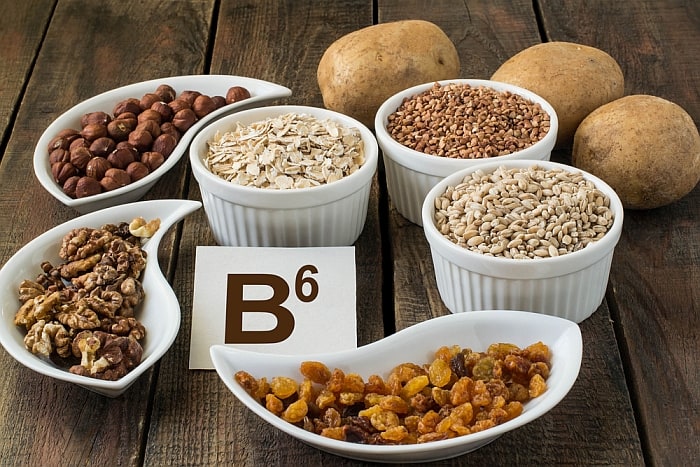
The following five multivitamins are among the best available in the market. Most are quite delicious to dogs, making them very easy to administer.
We’ve said it before, but we’re going to say it one more time because it’s important: Do not provide your pet with supplemental dog vitamins unless directly instructed to do so by your veterinarian.
Improper vitamin supplementation can be very dangerous for dogs.
1. Finn Multivitamin
This is a sponsored placement, in which an advertiser pays a fee to be featured in this article. Learn more
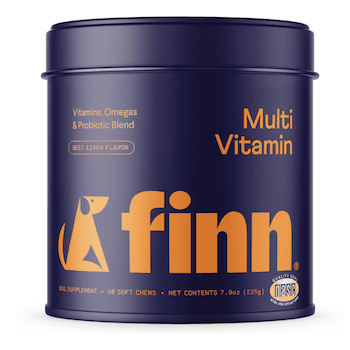
Finn Multivitamin
A mutt multivitamin made to boost head-to-tail wellness, from skin support to immune health.
About: Finn Multivitamins are all-in-one chewable canine vitamins utilizing a scientifically-balanced formula to provide your pup with a daily dose of vitamins. These canine multivitamins have it all, including glucosamine, chondroitin, and MSM for joint health, EPA and DHA omega-3 fatty acids for healthy skin, a probiotic blend to aid in digestive function, and a B-vitamin mix and CoQ10 for heart health.
Features:
- All chews are lab-tested before leaving the Finn Labs
- Manufacturer uses a unique code that tracks ingredient supplier, manufacturing shift, testing, and processing for every batch
- Chews contain no cellulose powder, silicon dioxide, maltodextrin, corn, soy, or wheat
- Made in the USA at a cGMP facility that’s FDA-registered and certified with the National Animal Supplement Council (NASC)
Ingredients List
Active Ingredients: Probiotic Blend, Glucosamine HCL, Methyl Sulfonyl Methane...,
Chondroitin, EPA, DHA, CoQ10, Vitamin C, Vitamin B12, Thiamine (Vitamin B1), Riboflavin (Vitamin B2), Pyridoxine (Vitamin B6), Biotin, Inactive Ingredients: Brewer’s Yeast, Tapioca Starch, Vegetable Glycerin, Purified Water, Sunflower Lecithin, Natural Cheese, Safflower Oil, Natural Beef Liver, Organic Honey, Natural Bacon Flavor, Ascorbic Acid, Mixed Tocopherols, Natural Preservative.
Pros
- Most dogs seem to love the taste
- Offers a wide array of vitamins and canine health support (including probiotics!)
- Excellent manufacturing safety processes
Cons
- On the pricey side
- Some owners find the chews’ odor overwhelming (but the resealable tin they come in should keep odors sealed away)!
2. Pet MD Canine Tabs Plus
This is a sponsored placement, in which an advertiser pays a fee to be featured in this article. Learn more
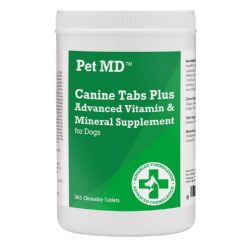
Pet MD Canine Tabs
Liver-flavored, veterinarian-formulated vitamin tablets that are great for dogs of all breeds and sizes.
About: Pet MD Canine Tabs are based on an advanced veterinary formula designed to provide your pup with the vitamins and minerals he needs to stay healthy, no matter his breed or size. Each bottle contains 365 tablets, so you may only have to order them once per year if your doggo is small.
Features:
- Flavored with natural liver powder for a great taste that dogs love
- Can be served as a chewable or crushed into food
- Certified safe and tested for Coliform, Salmonella spp., Staphlococcus aureus, coliform bacteria, yeasts and mold
- Made in the USA at FDA-, USDA- and FSIS-certified facilities
Ingredients List
Dicalcium Phosphate, Cellulose, Molasses (Sucrose), Liver Powder...,
Ascorbic Acid, Stearic Acid, Choline Bitartrate, Dl-Alpha Tocopheryl Acetate, Natural Flavor, Safflower Oil, Potassium Chloride, Magnesium Stearate, Silicon Dioxide, Ferrous Fumarate, Potassium Iodide, Niacinamide, Vitamin A Acetate, Zinc Oxide, Manganese Sulfate, Vitamin B12 Supplement, D-Calcium Pantothenate, Riboflavin, Vitamin D3 Supplement, Pyridoxine Hydrochloride, Thiamine Mononitrate, Copper Sulfate, D-Biotin, Folic Acid.
Pros
- Large container count is a hit for families with large dogs or multiple pups
- Flavor is liked by many canine consumers
- Easily crushes to sprinkle over food if necessary
Cons
- Tablets can sustain more damage during shipping and handling, leading to broken bits
- Picky dogs may refuse to give these a try
3. Vita Health Adult Daily Vitamins
This is a sponsored placement, in which an advertiser pays a fee to be featured in this article. Learn more
About: Vita Health Daily Vitamins are budget-friendly chewables scientifically formulated to provide the vitamins and minerals dogs need. Serve on their own or crush over your floof’s food for a daily dose of wellness.
Features:
- Provides 8 vitamins and 10 minerals that your dog needs
- Parsley leaf included to freshen your pet’s breath
- Available in 3 formulations: Puppy, Adult, and Senior
- Made in the USA at a cGMP- and NSF-certified facility
Ingredients List
Maltodextrin, Microcrystalline Cellulose, Dicaclium Phosphate...,
Natural Flavoring, Brewer’s Dried Yeast, Stearic Acid, Parsley Leaf Powder, Silica Aerogel, Magnesium Stearate, Ferrous Sulfate, Niacin Supplement, Beta Carotene, Vegetable Oil, Vitamin A Palmitate, Vitamin E Supplement, Zinc Sulfate, di-Methionine, Riboflavin, Thiamine Mononitrate, Vitamin D3 Supplement, Manganese Sulfate, Vitamin B12 Supplement, Pyridoxine Hydrochloride, Copper Carbonate, Potassium Iodine and Cobalt Carbonate.
Pros
- Price won’t ding your budget too badly
- Various life stage recipes is a win
- Easy to crush and hide in food if necessary
Cons
- Some owners find the smell off-putting
- Picky dogs may refuse to sample these tablets
4. PetHonesty 10-For-1 Multivitamin
This is a sponsored placement, in which an advertiser pays a fee to be featured in this article. Learn more
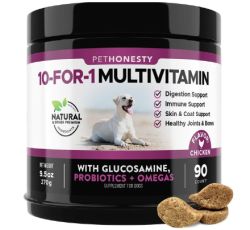
PetHonesty 10-For-1 Multivitamin
A chewable packed with vitamins and extras like joint-boosting glucosamine, probiotics, and more.
About: PetHonesty 10-For-1 Multivitamins are a savory snack loaded with core canine nutrients that support your dog from his legendary heart to his ever-learning brain. This easy-to-chew supplement also keeps your four-footer moving with glucosamine and chondroitin.
Features:
- Probiotic mix boosts gut health
- Contains 90 chewables per tub
- Available in chicken and peanut butter flavors as well as senior smoked duck and max strength smoked salmon
- American made with globally sourced ingredients
Ingredients List
Oat flour, Palm oil, Natural and artificial flavors, Ground flaxseed...,
Dried ground pumpkin, Dried ground sweet potato, Sunflower lecithin, Microcrystalline cellulose, Coconut glycerin, Brown rice syrup, Ascorbic acid, Hydrolyzed yeast, Natural chicken flavor and un-hydrolyzed egg membrane, Sorbic acid, Manganese proteinate, Mixed tocopherols, Rosemary extract, Zinc proteinate, Selenium yeast
Pros
- Texture and size well-suited for most breeds
- Heaps of extras, like joint and digestive-friendly ingredients
- The majority of dogs appear to like the taste
Cons
- Some ingredients can be a problem for pups with sensitivities
- A few dogs had tummy troubles (though this can happen with any new supplement)
5. Pet Tabs Original Formula Vitamin Supplement
This is a sponsored placement, in which an advertiser pays a fee to be featured in this article. Learn more
About: Pet Tabs Original Formula Vitamin Supplements are a tasty and easy-to-administer solution to your dog’s vitamin and mineral needs. You can either offer these dog vitamin tablets (or portions thereof for dogs under 20 pounds) by hand or crumble them and add them to your pup’s food.
Features:
- Each tablet provides 8 vitamins and 10 minerals
- Available in 180 and 365-count packages
- Provides a small amount of protein in addition to the vitamins and minerals
- Made in the USA
Ingredients List
Wheat Germ, Kaolin, Corn Syrup, Pork Liver Meal...,
Dicalcium Phosphate, Sugar, Lactose, Safflower Oil, Gelatin, Corn Starch, Stearic Acid, Niacinamide, Hydrolyzed Soy Protein, Iron Oxide and Proteinate, Magnesium Stearate, dl-Alpha Tocopheryl Acetate, Vitamin A Acetate, Zinc Oxide, Riboflavin-5-Phosphate, Thiamine Mononitrate, Pyridoxine Hydrochloride, Vitamin B12 Supplement, Manganese Sulfate, Copper Acetate Monohydrate, Vitamin D3 Supplement, Cobalt Sulfate.
Pros
- Pricing is great, considering the large-count containers
- Tablets are easily crushed over food or palatable on their own
- Many owners report an improvement in canine coats
Cons
- Ingredient list contains corn syrup, which some owners dislike
- Not every dog cares for the taste or texture of tablets
6. NaturVet VitaPet Puppy Daily Vitamins
This is a sponsored placement, in which an advertiser pays a fee to be featured in this article. Learn more
About: NaturVet VitaPet Puppy Daily Vitamins are specially formulated to meet the needs of growing puppies with potassium, iron, magnesium, and more. Made to mimic treats with their munchy morsel mouthfeel, these soft chews are an easy addition to your daily routine.
Features:
- Vet-formulated with key nutrients for puppy development
- 100-percent wheat-free recipe
- Bears the NASC quality seal
- Made in the USA at a cGMP facility
Ingredients List
Brewers Dried Yeast, Dried Potato Product, Glycerin, Flaxseed...,
Lecithin, Canola oil, Parsley Leaf, Dicalcium Phosphate, Maltodextrin, Natural Flavoring, Water, Vitamin E Supplement, Magnesium Stearate, Ferrous Sulfate, Tapioca Starch, Vegetable Oil, Sorbic Acid, Mixed Tocopherols, Rosemary Extract, Ascorbic Acid, Vitamin A Palmitate, Biotin, Zinc Sulfate, Niacin Supplement, Vitamin D3 Supplement, Vitamin B12 Supplement, Riboflavin, Menadione Sodium Bisulfite Complex, Pantothenic Acid, Pyridoxin Hydrochloride, Thiamine Mononitrate, Manganese Sulfate, Potassium Iodide, Copper Carbonate, Folic Acid, Cobalt Carbonate
Pros
- Small size perfect for puppies
- Affordably priced
- Comes with a manufacturer’s money-back guarantee
Cons
- Pickier puppies aren’t always a fan of the flavor
- Some puppies experienced stomach upset
7. VetriScience Canine Plus Multivitamin
This is a sponsored placement, in which an advertiser pays a fee to be featured in this article. Learn more
About: VetriScience’s Canine Plus Multivitamin is a vet-formulated dog vitamin designed to support aging puppers with skin-nourishing fatty acids and calcium and phosphorus for bone health. It also contains inositol, a naturally-occurring sugar that aids in cognitive and metabolic processes.
Features:
- Supports key organ systems in seniors, including brain, liver, and eye health
- Available in tasty duck soft chews and tablets
- Comes in 60-count packages
- Made in the USA
Ingredients List
Oat Flour, Brewers Dried Yeast, Glycerin, Rye Flour...,
Dicalcium Phosphate, Vegetable Flavor, Arabic Gum, Calcium Carbonate, Soy Lecithin, Fish Oil, Canola Oil, L-Ascorbyl-2- Polyhosphate, Maltodextrin, Sodium Alginate, Calcium Sulfate, Citrus Pectin, Coconut Oil, Water, Vitamin E Supplement, L-Arginine, Vitamin B12 Supplement, Dl-Methionine, Ferrous Sulfate, Sorbic Acid (A Preservative), Zinc Sulfate, Niacinamide, D-Calcium Pantothenate, Magnesium Oxide, Mixed Tocopherols (A Preservative), Propionic Acid (A Preservative), Manganese Sulfate, Inositol, Riboflavin, Copper Sulfate, Pyridoxine Hydrochloride, Vitamin D Supplement, Vitamin A Supplement, Sodium Selenite, Thiamine Mononitrate, Biotin, Folic Acid, Potassium Chloride, Calcium Iodate
Pros
- Senior-specific formula catered to areas of concern, like eyes, the immune system, and the brain
- Choice between tablets and chewables is always a plus
- Yummy duck flavor piques the interest of senior pups (infamously known for pickiness!)
Cons
- Long ingredient list may not be ideal for dogs with food restrictions
- While the chewables are usually soft, some owners experienced tougher batches that were hard for senior sniffers to chew
8. Zesty Paws 8-in-1 Bites
This is a sponsored placement, in which an advertiser pays a fee to be featured in this article. Learn more
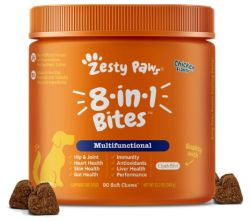
Zesty Paws 8-in-1 Bites
Delicious, soft chew dog vitamins that are made with glucosamine, MSM, and chondroitin.
About: Zesty Paws 8-in-1 Bites aid in mutt mobility with a blend of shellfish-derived glucosamine, chondroitin, and MSM on top of nourishing your dog with essential vitamins. Digestive wellness is also a focus with a 5-strain probiotic blend.
Features:
- Available in three delicious flavors and an advanced formula
- Contains no corn, soy, or wheat
- Awarded the NASC quality seal
- Made in the USA with globally sourced ingredients
Ingredients List
Glucosamine HCL, MSM, Cod Liver Oil, Enzyme Blend...,
Total Microbial Count, Chondroitin Sulfate, Vitamin A, Vitamin D3, Vitamin E, Vitamin C, Niacin, Coenzyme Q10, Vitamin B1, Pantothenic Acid, Vitamin B6, Vitamin B2 (Riboflavin), Manganese, Folic Acid, Biotin, Vitamin B-12, Chicken Meal, Coconut Glycerin, Flaxseed Meal, Natural Chicken Flavoring, Oat Flour, Palm Fruit Oil, Powdered Cellulose, Pumpkin, Rice Flour, Sorbic Acid, Sunflower Lecithin
Pros
- Joint-friendly ingredients like glucosamine, chondroitin, and MSM keep your canine cruising comfortably
- Flavor leaves most puppers pleased
- Budget-friendly pricing
Cons
- Ingredients may not mesh well with sensitive systems
- Texture consistency issues reported by some pet parents
9. Golden Paw 10 In 1 Cat & Dog Multivitamin
This is a sponsored placement, in which an advertiser pays a fee to be featured in this article. Learn more
About: Vetflix Pet Vitamins is a liquid blend of vitamins and other essential nutrients, including fatty acids for skin and coat health. Best of all, because it comes in liquid form, you can serve it right over your pet’s kibble for a no-fuss vitamin fix.
Features:
- Contains glucosamine and omega-3 fatty acids for joint health
- Included pumpkin seeds may help keep your dog’s pipes moving in the right direction
- Packaged in a travel-friendly 2-ounce bottle
- Made in the USA with globally sourced ingredients
Ingredients List
Vitamin A (as palmitate), Vitamin C (as ascorbic acid), Vitamin D (as cholecalciferol), Thiamin (Vitamin B1) (as thiamine mononitrate), Riboflavin (Vitamin B2) (as riboflavin)...,
Vitamin B6 (as pyridoxine HCL), Folic Acid, Vitamin B12 (as cyanocobalamin), Biotin, Pantothenic Acid (as d-calcium pantothenate), Cranberry (Vaccinium subg. Oxycoccus)(fruit), Organic agave inulin, Pumpkin (Cucurbita) (seed), Glucosamine sulfate), Purified Water, Vegetable Glycerin, Potassium Sorbate, Citric Acid.
Pros
- Liquid easily mixes into any food
- Perfect for senior dogs who may struggle with tablets or chewables
- Multi-species formula can be used for dogs or cats
Cons
- Smell can be too strong for some pups (and pup parents)
- Messier than tablets or chewables
One Kind of Dog Vitamin to Avoid: Those with Incomplete Ingredient Lists
While the dog vitamins discussed above should all be pretty good options for your pooch (assuming you’ve received your vet’s approval to administer one), there are a few bad options on the market that are best avoided.
Now, dog vitamins can pose a variety of different problems that make them poor choices for your pooch. But one of the biggest red flags occurs when manufacturers fail to list the ingredients used in their vitamins in a comprehensive and transparent fashion.
In fact, we changed our minds about the best liquid dog vitamin to recommend to our readers based on a manufacturer’s evasive responses to our inquiries.
We liked a lot of things about this particular manufacturer’s vitamins, but we simply can’t encourage our readers to purchase from a brand that won’t immediately share something as simple as a properly formatted ingredient list.
Honestly, we shouldn’t have even needed to ask — they should have just supplied a full ingredient list from the get-go.
What Are Vitamins, Anyway?
Vitamins are small organic molecules that the body uses to carry out various biological processes. Your dog’s body is unable to make most vitamins (there are a few exceptions), so they must be obtained via the diet (although some vitamins, such as Vitamin E, may also be absorbed through the skin).
Vitamins can be derived from a number of foods, but some of the best sources include fresh fruits, fresh vegetables, dairy products, and organ meats.

Most commercial dog foods are fortified with vitamins, but owners can also provide their dog with supplemental vitamins – much like those humans take.
Although a number of supplements are often thrown into the “vitamin” category, things like probiotics, glucosamine, chondroitin, fish oils, calcium, zinc and several other common supplements should not be considered vitamins.
These compounds play a number of beneficial roles in your dog’s body, and many – especially various minerals – are included in multivitamin supplements. However, these all represent different types of substances, which do not fit the definition of a vitamin.
What Kinds of Vitamins Does My Dog Need?

Vitamins are not all created equally, and they have a number of chemical differences.
Scientists recognize 13 different vitamins that are crucial for good health, and they name most of them after a letter (sometimes followed by a number). Each of these vitamins plays a different biological role, and your dog needs each in different amounts.
Vitamins are classified in two primary categories: water soluble and fat soluble. Because they are handled very different by the body, they are best explained separately.

Water Soluble Vitamins
Most of the vitamins your dog’s body needs are water soluble, meaning that they dissolve readily in water.
Because of this, these vitamins are not stored in the body in significant quantities. This means that they must be ingested on a daily basis to ensure their body has enough at any given time, making them essential vitamins.
All recommendations taken from the AAFCO’s Proposed Revisions Edited per Comments for 2014 Official Publication. All values are provided as milligram or international unit per kilogram of food consumed, assuming a caloric density of 4000 kcal ME/kg.
The primary water-soluble vitamins include:
Vitamin B1
Also called, thiamine, Vitamin B1 helps to promote proper nervous system function and is involved in appetite stimulation and the metabolism of food.
Weakness, loss of bodily control, and diminished appetite can all occur in dogs who do not obtain enough of this vitamin.
Dogs of all life stages need approximately 2.25 milligram of Vitamin B1 per kilogram of food consumed every day.
Vitamin B2
More commonly called riboflavin, Vitamin B2 is very important for good vision and healthy eyes, and it also helps support the cardiovascular system. It also helps your dog’s body to produce niacin from the amino acid tryptophan.
Dogs of all life stages require 5.2 milligrams of riboflavin per kilogram of food consumed every day to avoid problems like poor vision or heart failure.
Vitamin B3
Better known as niacin, Vitamin B3 is important for healthy skin, nerves and proper energy production. Dogs who fail to get enough Vitamin B3 may exhibit inflamed gums, bloody diarrhea or diminished appetite.
Dogs of all life stages require approximately 13.6 milligrams of B3 per kilogram of food consumed everyday.
Vitamin B5
Vitamin B5, or pantothenic acid, as it is sometimes called, is involved with food metabolism and hormone production. Dogs suffering from a Vitamin B5 deficiency may lose hair or exhibit premature graying.
Dogs of all life stages need approximately 12 milligrams of Vitamin B5 for each kilogram of food consumed each day.
Vitamin B6
Vitamin B6 – also called pyridoxine – helps the body produce red blood cells, hemoglobin and insulin. Anemia often results from Vitamin B6 deficiencies, although some dogs may develop skin lesions and other signs of poor skin health if not provided enough of this crucial vitamin.
Dogs of all life stages require approximately 1.5 milligram of Vitamin B6 for each kilogram of food consumed each day.
Vitamin B7
Vitamin B7, also known as biotin, is very important for digestion, as it helps your dog’s body breakdown carbohydrates, fats and proteins. Intestinal disruptions are a common symptom of Vitamin B7 deficiency, as are dry skin and poor coat condition.
Your dog needs Vitamin B7, but the AAFCO has not established a recommended daily dosage for it.
Vitamin B12
Occasionally called cobalamin, Vitamin B12 helps to maintain the nervous system, produce red blood cells and assist in the construction of genetic material (DNA and RNA).
Despite being important to these crucial biological functions, dogs only need a minute amount of Vitamin B12 – about .028 milligrams per kilogram of food consumed (regardless of life stage) – each day.
Folic Acid
Folic acid primarily plays a role in red blood cell formation, although it may also be associated with protecting cardiovascular health.
Dogs of any life stage who fail to get the required daily dose — 0.216 milligrams per kilogram of food consumed – may develop anemia.
Vitamin C
Vitamin C, which is sometimes called ascorbic acid, helps your dog’s body produce collagen, which is a connective tissue that helps to hold the body’s bones, muscles, organs, tendons and ligaments in place. It also plays roles in bone formation, the healing process and proper immune function.
Dogs produce their own Vitamin C, so you needn’t provide it to them.
Fat Soluble Vitamins

Fat soluble vitamins do not dissolve readily in water, and your dog’s body stores them in the liver and various fatty tissues. These types of vitamins stick around in your dog’s body for a long time, and, if given in excessive quantities, they may lead to health problems.
In fact, excessive levels of fat-soluble vitamins (particularly Vitamins A and D) are especially dangerous for growing dogs, once again highlighting the importance of working closely with your vet, rather than just providing supplemental vitamins in a haphazard fashion.
The primary fat-soluble vitamins include:
Vitamin A
Vitamin A – also called retinol – is important for a variety of biological processes. Some of the most noteworthy include bone growth, cell division, immune system regulation and gene expression.
Dogs of all life stages require about 5,000 International Units of Vitamin A per kilogram of food consumed per day.
Because fat-soluble vitamins can lead to toxicity problems if given in excessive amounts, many multivitamins and supplements contain beta carotene, which is a Vitamin A precursor that the body converts as necessary, rather than retinol. This prevents your dog’s body from suffering from a toxic buildup of Vitamin A (retinol).
Vitamin D
Vitamin D — especially the active form of the vitamin, known as Vitamin D3 – is heavily involved in the biochemical processes involving calcium and phosphorus, particularly the absorption of calcium from the small intestine. Vitamin D deficiency can result in rickets and poor tooth development.
Dogs of all life stages require about 500 IU of Vitamin D per kilogram of food consumed each day.
Vitamin E
Vitamin E, often called tocopherol, is an antioxidant that helps to protect blood cells and essential fatty acids. Vitamin E deficiencies can cause intestinal disease or reproductive failures.
Dogs of all life stages need about 50 IU of Vitamin E per kilogram of food consumed each day.
Vitamin K
Vitamin K is obtained through a variety of food sources, but bacteria in the intestinal tract also produce it as well. Vitamin K is involved in the blood-clotting process, and it is responsible for helping to promote proper bone health and development. Dogs who suffer Vitamin K deficiencies may suffer from internal bleeding or altered clotting times.
The AAFCO has not established a daily recommendation for Vitamin K in dogs.
Don’t have easy access to a vet? You may want to consider getting help from JustAnswer — a service that provides instant virtual-chat access to a certified vet online.
You can discuss the issue with them, and even share video or photos if need be. The online vet can help you determine what your next steps should be.
While talking with your own vet — who understands the ins and outs of your dog’s history — is probably ideal, JustAnswer is a good backup option.
How to Know If Your Dog’s Vitamins are Safe

Unfortunately, the dog supplement market is a Wild West of products with little to no oversight. It’s vital to do your research before offering any to your dog.
Follow these easy steps to find the best dog vitamins:
- Look for the NASC Quality Seal. The National Animal Supplement Council is a group devoted to ensuring safe supplements for companion animals, including dogs. Products must undergo vigorous testing to earn this seal, making it a must-have for the best of the best.
- Purchase US-made products. Stick to American-made dog vitamins and supplements whenever possible. Imported products aren’t always made with proper safety precautions, putting your dog at risk.
- Check ingredients. Every vitamin supplement for dogs should have a clearly labeled list of ingredients. If it doesn’t, run the other way.
Always run supplements by your vet to ensure they’re the best choice for your dog’s unique needs.
Vitamins for Dogs FAQ
Still have some questions about dog vitamins? Check out these frequently asked questions.
What vitamin is best for dogs?
The best dog vitamins are the ones recommended by your vet.
Supplementing a dog’s diet with vitamins isn’t necessary for most canines, but there are cases where it’s crucial, like during pregnancy, when nursing, or if you’re feeding your floof a homemade diet. In those cases, speak with your vet to determine what vitamin would work best to ensure your pup gets the extra nutrients required.
Should I give my dog vitamins?
While dog vitamins seem like a must-have for maintenance, most likely, they’re unnecessary for your dog. A balanced diet of AAFCO-approved dog food for your pup’s life stage and health conditions already offers the nutrients he needs. Unless your vet has noted vitamin deficiencies in him, your dog probably doesn’t need them.
Most of the time, feeding your dog unnecessary vitamins is simply wasting money, but it can also cause harm, especially if your canine has certain health conditions. Excessive vitamin levels can throw off everything from growth to digestion. Only serve your dog vitamins if your vet gives the green light.
What supplement should I add to dog food?
Generally speaking, most canines don’t need vitamin supplements added to their dog food. As long as your dog eats an AAFCO-approved dog food that meets his life stage and health conditions, he’s likely fine in the vitamin department.
On the flip side, vitamin deficiencies are most common in dogs eating homemade or raw diets. If offering these diets, always consult a vet to ensure adequate vitamins and minerals in your dog’s food.
If you’re worried your dog isn’t getting the nutrients he needs or if he’s exhibiting symptoms like a dry coat or itchy skin, visit your vet for a thorough exam.
Can I give my dog human vitamins?
No, human vitamins shouldn’t be given to dogs.
Not only are the dosages often far higher than dogs need, but the ingredient lists vary significantly. Human supplements may contain ingredients that are toxic to dogs.
Can vitamins be dangerous for dogs?
Yes, dog vitamins can be dangerous. Always consult with your vet before offering any vitamin, as dogs eating AAFCO-approved foods for their life stage generally aren’t deficient in vitamins.
Unnecessary supplementation can negatively impact your dog’s health, particularly if he has any underlying conditions.
Do dogs make their own vitamins?
While many vitamins come from your dog’s diet, vitamin C is made naturally by your dog’s body and should never be given as a supplement unless your dog has a vet-diagnosed deficiency. Excessive vitamin C levels can lead to diarrhea and worse in canines.
Do dogs need the same vitamins as people?
Humans and dogs often require many of the same vitamins, but the amount varies significantly. Never offer human vitamins to your dog, no matter how similar they seem. Certain ingredients used in human vitamins are toxic to dogs.
***
Do you give your dog a multivitamin on a regular basis? What made you start doing so? Have you found one that worked better than others?
We’d love to hear about your experiences in the comments below.


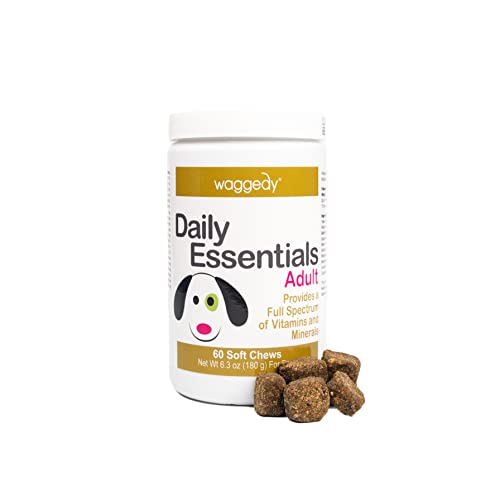
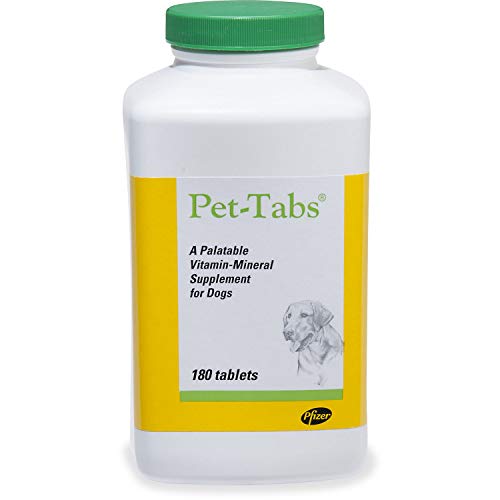
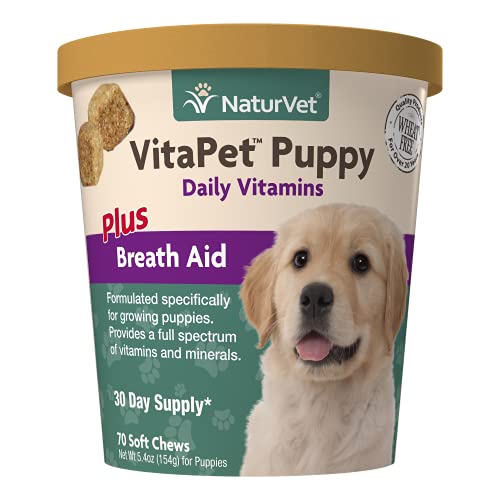
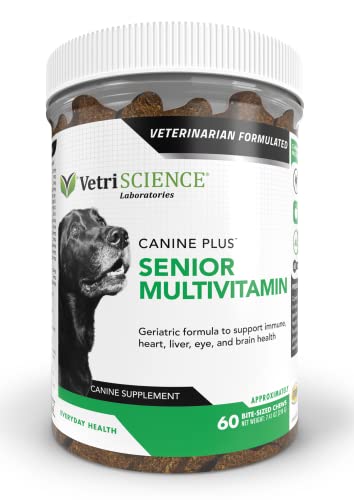
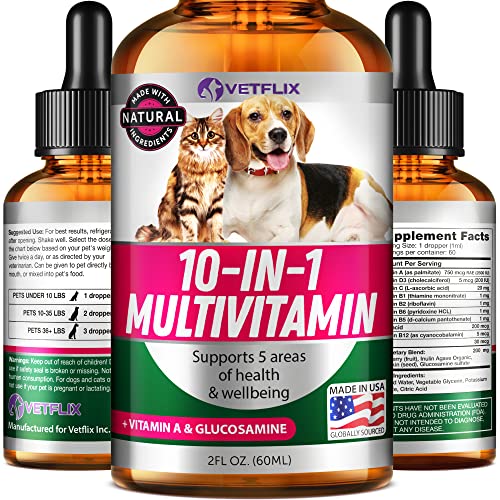





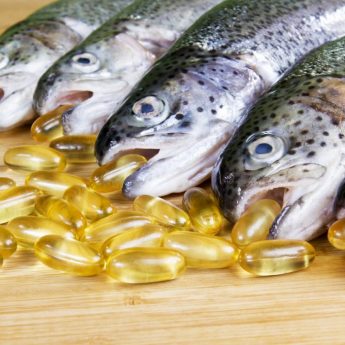
5 Comments
May 12, 2020
I have used the petjoy multi vitamins soft chew and my dogs love them, also I saw a big different in them in one weeks time. One of my dogs that is 13 yrs old has never done anything in her life except eat and sleep. She would never play but she dose love being in your lap. Now she acts like she has more life in her plus she even started dancing when its time to eat plus she will bark at you when she wants something. It’s just amazing the different in how she acts, wish I had found these years ago. My other dog that is 13 yrs old also show signs of being more alert and happier and wants to play. I can’t see buying anything else when I know what this has done for them.
August 28, 2019
You should never, ever give your pets folic acid, fake vitamin C etc. Folate is different from folic acid, which is basically poison.
August 28, 2019
That’s just not true, Joseph.
Folic acid is simply a synthetic form of folate (Vitamin B9). In fact, folic acid supplementation is necessary for treating some health problems in dogs.
I’m not sure what you’re referencing about the “fake Vitamin C.” As we mentioned, you don’t even need to worry about Vitamin C for your pupper, as his body makes it naturally.
February 17, 2019
I feed a raw diet, which is wet. How do I adjust the amounts listed for each supplement. Do you know the dosages according to a dogs weight? That might make more sense. Thanks
August 17, 2019
Focus on the correct dosing of fat soluble vitamins; A, E, D …., tailored to the animals weight. The water soluble vitamins, B1, B2, B3 … will not accumulate over time like the fat soluble vitamins so a little extra will not be a problem and do not forget the minerals. Learn your animals needs; dose mg/lb or kg. Keep reading!